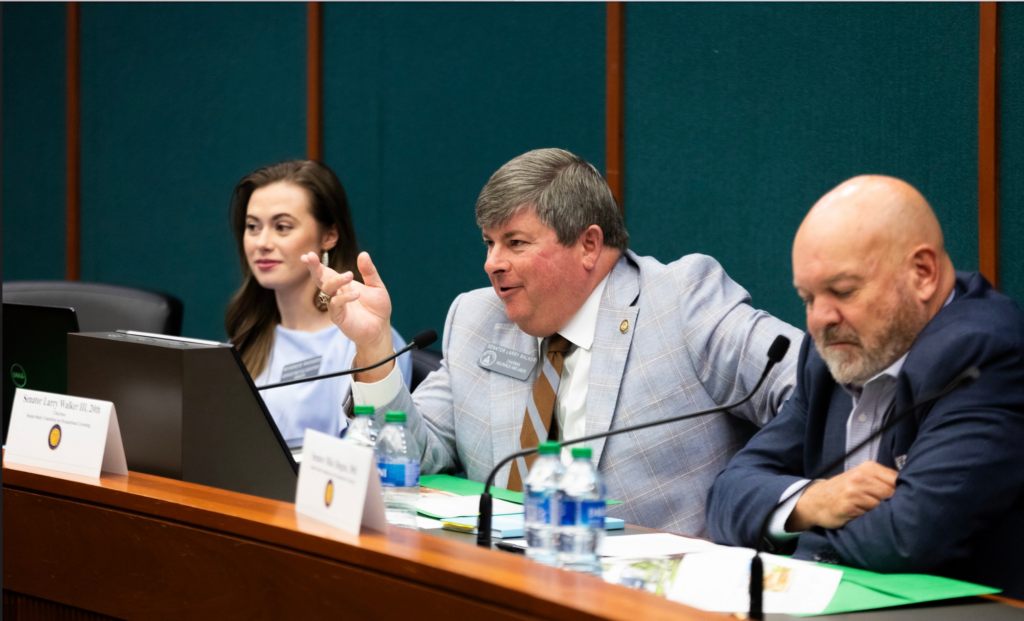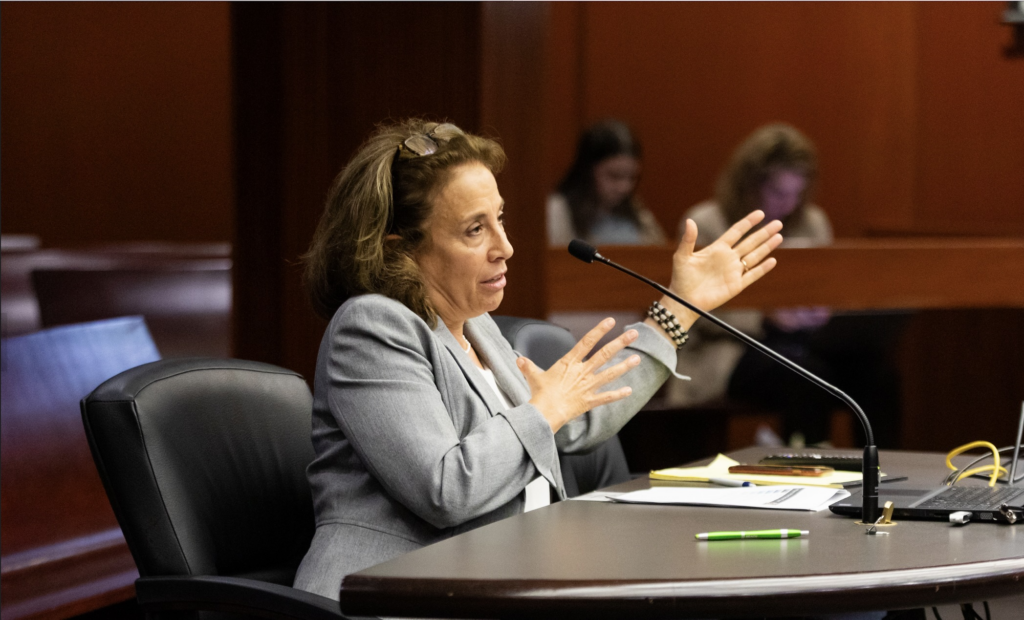Stay ahead of the curve as a political insider with deep policy analysis, daily briefings and policy-shaping tools.
Request a DemoGeorgia considering occupational licensing reform

Some foreign-trained doctors and other health care professionals wait for years for approval to practice in Georgia, due to the state's demanding occupational licensing requirements. (Credit: baona)
The Gist
ATLANTA — As Georgia grapples with a severe workforce shortage, a Senate committee is looking at changing laws and policies that keep skilled professionals, including doctors and nurses, waiting a year or more to get to work.
What’s Happening
The Senate Study Committee on Occupational Licensing heard this week from several experts with insights into the bureaucratic barriers plaguing skilled workers.
Many occupational licenses in Georgia are issued by one of 43 licensing boards housed in the Professional Licensing Boards Division of the secretary of state’s office. They cover 197 license types, including cosmetologists, nurses, social workers, foresters, architects and plumbers. Other professions are regulated by independent state boards, including doctors, engineers and realtors.
About 30% of U.S. workers need a license to work, said Marc Hyden, director of state government affairs for R Street Institute, a public policy think tank based in Washington, D.C.
Hyden praised recent laws passed in Georgia that have expedited the process for veterans and military spouses with professional skills to obtain licenses when they move into the state. But he said more reforms are needed.
The licensing division is understaffed and underfunded, Hyden said, and receives only $8.5 million of the $24 million it generates from licensing fees. This lack of resources prevents some boards from providing timely and efficient service, he said, creating a backlog of prospective skilled workers.

About 27% of professional license applications administered by the Professional Licensing Board Division take a year or more to process, according to the secretary of state. The rest can take up to six months. Some boards are relying on paper applications, mail service and manual processes to handle applications.
Why It Matters
Hyden noted that other states manage to issue licenses within 30 days, in part because their boards are better staffed and meet more often — monthly, instead of quarterly, as with some Georgia boards.
Georgia is enjoying record economic growth. Over the last four years, the state has attracted over 1,700 economic development projects, $65 billion in investment and 165,000 jobs, according to the Georgia Chamber of Commerce.
But the state’s workforce can’t supply enough workers to meet the growing number of job opportunities. There is only one job seeker for every three job postings, the Chamber said.
Among jobs in highest demand in Georgia are registered nurses, pharmacists, accountants, construction contractors and truck drivers – all of which require state licenses. Many workers now in these fields are nearing retirement.
According to the Georgia Health Care Workforce Commission, 20% of health care workers are over age 55 and looking to retire in the next 10 years. About 4% of the health care workforce leaves annually and is not being replaced by new graduates.
Most of the state is medically underserved, with 65 of Georgia’s 159 counties without a pediatrician, 82 counties without an obstetrician and 90 without a psychiatrist.
To draw more people into skilled professions, “we need to think creatively … and improve licensing,” said Daniela Perry, vice president of the Chamber.
What’s Next
One area ripe for reform is how the state handles licensing of professionals who come to Georgia from other states and countries.
Since 2019, 22 U.S. states have adopted universal license recognition laws that establish a streamlined process to recognize professional licenses issued by another state. If the applicant holds a license in good standing and has no pending disciplinary actions or a disqualifying criminal record in one state, they can practice in another.
This year Georgia passed HB 155, which allows licensing boards to grant licenses to some out-of-state professionals if the license they hold is “substantially similar” in qualifications and scope to what Georgia requires.
The Georgia law is more restrictive than those in other states, which only call for “similar” qualifications and don’t require residency, said Austen Bannan, an employment expert with Americans for Prosperity. Other states allow years of professional experience to stand in for some training requirements. Georgia doesn’t, mandating seasoned skilled tradespeople pursue hundreds or thousands of hours of additional training.
“The idea is not to force people to relearn their skill set,” Bannan said.
Georgia is also missing out on the skills of many foreign-trained professionals due to its stringent licensing requirements, said Darlene Lynch, who chairs the Business & Immigration for Georgia Partnership, which works to enhance economic development by tapping into the skills of immigrants.

Georgia’s foreign-born population has grown by 90% over the last 20 years, and 10% of Georgians — more than a million people — are now foreign born, she said, adding that half are naturalized citizens, and a third have college or graduate degrees.
Though 1 in 5 doctors in Georgia is foreign-born, Lynch said, “Too often we’re watching doctors driving Ubers, dentists working behind a CVS counter, a welder working at a poultry plant — they’re not going back to the field where they have the most experience.”
She urged the committee to adopt the licensing practices of other states, which recognize the medical credentials of foreign-born physicians and other health care professionals, and develop expedited pathways for other skilled immigrants to become licensed.
“We have a pool of talent that other states don’t have to draw upon,” Lynch said.
Sen. Larry Walker III, R-Perry, chair of the occupational licensing committee, said many of the issues raised at the meeting this week have come up at the GA WORKS Commission, an effort led by Secretary of State Brad Raffensperger this year to slash bureaucratic barriers in occupational licensing. That includes a total revamp of the application process, which is projected to be fully digitized by spring 2024.
“We’ve got to get into the modern world with this licensing issue if we’re going to continue to grow our economy,” Walker said.
Check out our summary on TikTok:
Have questions, comments or tips? Contact Jill Jordan Sieder on X @journalistajill or at [email protected].
X @STATEAFFAIRSGA
Facebook @STATEAFFAIRSGA
Instagram @STATEAFFAIRSGA
LinkedIn @STATEAFFAIRS
Header photo: Some foreign-trained doctors and other health professionals wait for years for approval to practice in Georgia, due to the state’s demanding occupational licensure requirements. (Credit: baona)
Professionals still face licensing delays amid state’s transition to online system
The Gist Georgia’s professionals and business owners are still struggling to obtain professional licenses in a timely manner. As the Secretary of State’s Office rolls out its new Georgia Online Application Licensing System to expedite the process, the efficiency of this new process is being put to the test. What’s Happening Thursday morning at the …
Controversy over AP African American Studies class grows
Rashad Brown has been teaching Advanced Placement African American Studies at Atlanta’s Maynard Jackson High School for three years. He’ll continue to do so — even though the state’s top education official removed it from the list of state-funded course offerings for the upcoming school year. While Brown prepares to start teaching his class on …
Students, teachers, lawmakers blast decision to end AP African American history classes
ATLANTA — A coalition of lawmakers, civil rights leaders, clergy, educators and students Wednesday called on the state’s education czar to rescind his decision to drop an advanced placement African American studies class from the state’s curriculum for the upcoming school year. “This decision is the latest attack in a long-running GOP assault on Georgia’s …
Kamala Harris’ presidential bid reinvigorates Georgia Democrats
Georgia Democrats have gained new momentum heading into the November election, propelled by President Joe Biden’s decision to bow out of his reelection bid and hand the reins to Vice President Kamala Harris. The historic decision, announced Sunday, is expected to prove pivotal in the national and state political arenas and breathe new life and …




